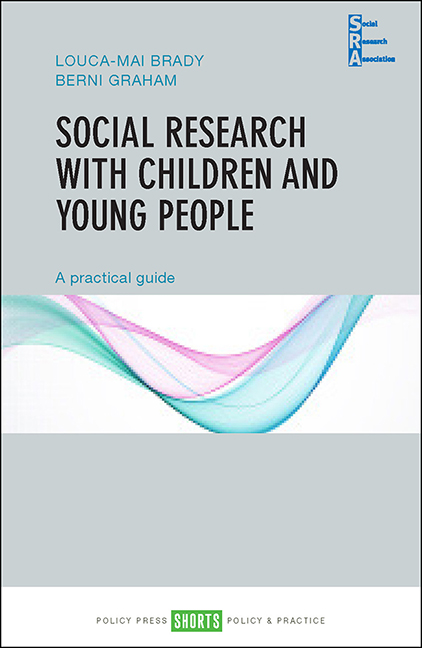Book contents
- Frontmatter
- Contents
- List of illustrations
- Notes on authors
- 1 Introduction
- 2 The context for social research with children and young people
- 3 Involving children and young people in research
- 4 Ethical considerations
- 5 Designing appropriate methods for children and young people
- 6 Conclusions
- Bibliography
- Index
- Social Research Association Shorts
6 - Conclusions
Published online by Cambridge University Press: 13 April 2022
- Frontmatter
- Contents
- List of illustrations
- Notes on authors
- 1 Introduction
- 2 The context for social research with children and young people
- 3 Involving children and young people in research
- 4 Ethical considerations
- 5 Designing appropriate methods for children and young people
- 6 Conclusions
- Bibliography
- Index
- Social Research Association Shorts
Summary
This book makes the case for doing social research and evaluation about and with children and young people, and the key ethical and methodological considerations for doing so in ways that are meaningful, effective and inclusive. Our work as researchers and trainers has led us to believe that social research and evaluation with children and young people should, first and foremost, start with an understanding of children's and young people's rights to have a say in matters that affect them, not least as they are experts in their own lives. Good research and evaluation needs to be carried out in ways that enable children and young people to be listened to, so that the policies and services which they inform better reflect children's and young people's priorities and concerns. Their lived experience and agency should be valued and respected. Adult views may need to be considered as well as, but not as a proxy for those of the children they parent, teach or provide services for. In order to ensure that children's and young people's priorities and concerns are accurately reflected, it is critical to consider the diversity of children and young people both in general terms and in ensuring appropriate sampling and methods.
However, the theory and principles outlined in Chapters One and Two can be far from straightforward to put into practice, and we hope that the suggestions and examples in Chapters Three to Five help to provide ideas on how to apply the theory and principles outlined in Chapters One and Two in real research situations. At a time of limited budgets and, often, a need for fast results from social research and evaluation, there is often a considerable distance between the research we would like to do and the research we are able to do. As practising researchers, we are very aware of the constraints, but nonetheless argue that there is plenty of scope to ensure that the voices of children and young people are captured in ways that are ethically and methodologically sound.
Ethics is of course a key consideration in all social research and evaluation. And, as discussed in Chapter Four, there is an additional onus on researchers to try even harder to get ethics ‘right’ when working with children and young people, not least because of their additional vulnerability, diversity and relative lack of research experience.
- Type
- Chapter
- Information
- Social Research with Children and Young PeopleA Practical Guide, pp. 137 - 140Publisher: Bristol University PressPrint publication year: 2018



